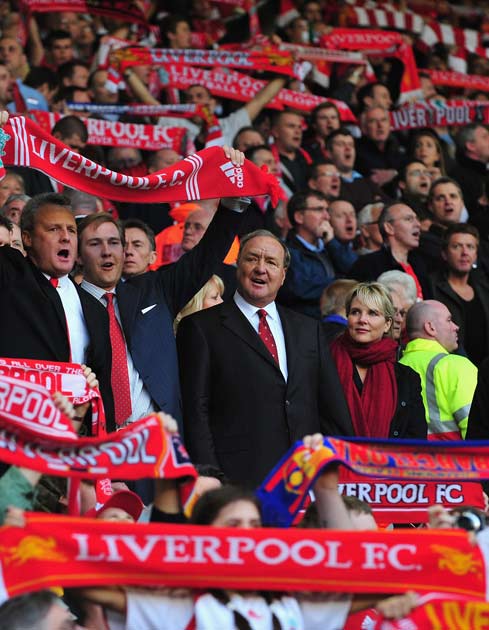Your support helps us to tell the story
From reproductive rights to climate change to Big Tech, The Independent is on the ground when the story is developing. Whether it's investigating the financials of Elon Musk's pro-Trump PAC or producing our latest documentary, 'The A Word', which shines a light on the American women fighting for reproductive rights, we know how important it is to parse out the facts from the messaging.
At such a critical moment in US history, we need reporters on the ground. Your donation allows us to keep sending journalists to speak to both sides of the story.
The Independent is trusted by Americans across the entire political spectrum. And unlike many other quality news outlets, we choose not to lock Americans out of our reporting and analysis with paywalls. We believe quality journalism should be available to everyone, paid for by those who can afford it.
Your support makes all the difference.Liverpool's owners Fenway Sports Group, the Royal Bank of Scotland and former chairman Sir Martin Broughton remain confident Tom Hicks' threat to sue over the sale of the club will fail after the Texan lost another court battle.
A High Court judge ruled Hicks must bring any claims he has in the UK and is not able to pursue a lawsuit in the United States, where damages can be much more punitive, without the permission of an English court.
But even should he press ahead with legal action in this country FSG, RBS and Broughton - who will be the subject of any claim - insist "there is no basis to challenge the propriety or validity of any actions".
FSG (then New England Sports Ventures) bought Liverpool for £300million back in October against the wishes of Hicks and co-owner George Gillett.
Hicks claimed he was the victim of an "epic swindle" and wanted Mr Justice Floyd to lift anti-suit orders which prevented him taking action in the Texas courts to halt the deal in which he claims he lost £140 million.
However, the judge dismissed the application, although he did vary the injunction to allow Hicks to make applications in the US in support of any proceedings in this country.
"We are delighted that Mr Justice Floyd has granted the applications requested by Sir Martin Broughton, RBS and NESV and that the anti-suit injunction prohibiting the former owners from commencing legal actions against these parties outside the EU has been upheld and clarified," said a Liverpool statement.
"Sir Martin, RBS and NESV continue to maintain that there is no basis to challenge the propriety or validity of any actions by them or any of those involved on their behalf in the sale of the club.
"They will continue to take all steps necessary to defend vigorously any litigation threatened or commenced by the club's former owners."
Mr Justice Floyd also dismissed an application to strike out or stay claims by Broughton seeking damages against Hicks for his actions while owner.
NESV's application to be allowed to join the Broughton action was granted by the judge.
The Boston-based company bought the club after repaying a £237 million loan Hicks and Gillett took out with RBS and Wells Fargo.
Mr Justice Floyd, in his ruling, said the sale of Liverpool came about because of Mr Hicks and Mr Gillett's indebtedness.
As the repayment date for the loan approached Broughton arranged a board meeting last October to consider two offers, both of which were opposed by the former owners.
The US pair purported to remove some of the English directors of the club and replace them with their own men but Broughton went ahead with a board meeting with the original directors and accepted the offer from NESV.
Hicks and Gillett then sought a temporary restraining order in Texas "expressly aimed at stopping the sale" according to Mr Justice Floyd.
It was at that time he allowed an anti-suit injunction "on the basis of what appeared to me to be the unconscionable conduct of the former owners in seeking to undermine the English proceedings".
Of his decision not to discharge the anti-suit injunction, he said: "The reality of the situation is that the former owners have already started two sets of proceedings and openly asserted their intention to start more.
"They will undoubtedly start more proceedings if allowed to do so. There is a real threat that those proceedings will be in the United States.
"I still find it difficult to imagine what possible real connection such a claim would have with any jurisdiction in the United States.
"The disputes concern an English asset, duties owed by English directors under English law to English companies, and corporate governance arrangements governed by English law.
"I think the time has come when they need to state their case or accept that they do not have one."

Join our commenting forum
Join thought-provoking conversations, follow other Independent readers and see their replies
Comments